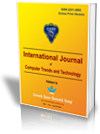Mental Stress and its Implications on Reaction time
 | International Journal of Computer Trends and Technology (IJCTT) |  |
| © - May Issue 2013 by IJCTT Journal | ||
| Volume-4 Issue-5 | ||
| Year of Publication : 2013 | ||
| Authors :Apoorvagiri, Nagananda M S |

Apoorvagiri, Nagananda M S"Mental Stress and its Implications on Reaction time"International Journal of Computer Trends and Technology (IJCTT),V4(5):1426-1430 May Issue 2013 .ISSN 2231-2803.www.ijcttjournal.org. Published by Seventh Sense Research Group.
Abstract: - Stress is a common in everyday life. Mental distress leads to increase in the reaction time and decrease in attention and concentration. It could results in poor performance. Reaction time implies on stress. When the mind gets exhausted, it usually faces some complications to do mental tasks at the satisfactory performance level which leads to many happenings and mishaps. Subsequently, monitoring of mental stress is essential to assess stress. This paper reviews about quantification of stress using reaction time.
References-
[1] Kato, Y., Endo, H., Kizuka, T., 2009. Mental stress and impaired response processes: event-related brain potential in a Go/NoGo task. Int. J. Psychophysiol.72, 204–211.
[2] Strohl, K., Merritt, P.S.L., Blatt, J., Pack, A.I., Council, Forrest, Rogus, Susan, Georges, Kate, Roth, Thomas, Kiley, James, Stutts, Jane, Kurrus, Roger, Waller, Pat, McCartt, Anne T., Willis, D., 1998. Drowsy Driving and Automobile Crashes. NHTSA, National Center on Sleep Disorders Research, National Heart, Lung, and Blood Institute.
[3] S. Triggs, T.J., Harris, W.G. (Eds.), 1982. Reaction Time of Drivers to Road Stimuli. Monash University, Victoria. p. 68.
[4] H. Selye, Selye’s Guide to Stress Research. Van Nostrand Reinhold Company , 1980.
[5] I. J. K. G. Eisenhofer and D. Goldstien, “Sympathoadrenal medullary system and stress, ” in Mechanisms of Physical and Emotional Stress. Plenum Press, 1988.
[6] A. Baddeley , “Selective attention and performance in dangerous environments, ” British Journal of Psychology, vol. 63, pp. 537–546, 1972.
[7] M. Vidulich, M. Stratton, and G. Wilson, “Performance-based and physiological measures of situational awareness, ” Aviation, Space and Environmental Medicine, pp. 7–12, May 1994.
[8] R. Helmreich, T . Chidster, H. Foushee, S. Gregorich, and J. Wilhelm, “How effective is cockpit resource management training? issues in evaluating the impact of programs to enhance crew coordination, ” Flight Safety Digest, vol. 9, no. 5, pp. 1–17, 1990.
[9] Luce, R. D.: Response Times: Their Role in Inferring Elementary Mental Organization. Oxford University Press, New York, 1986.
[10] Welford, A. T.: Choice reaction time: Basic concepts. In A. T. Welford (Ed.),, Reaction Times. Academic Press, New York, pp. 73-128. 1980.
Keywords — Distress, Eustress, Cognition, Latency, and Reaction Time.
